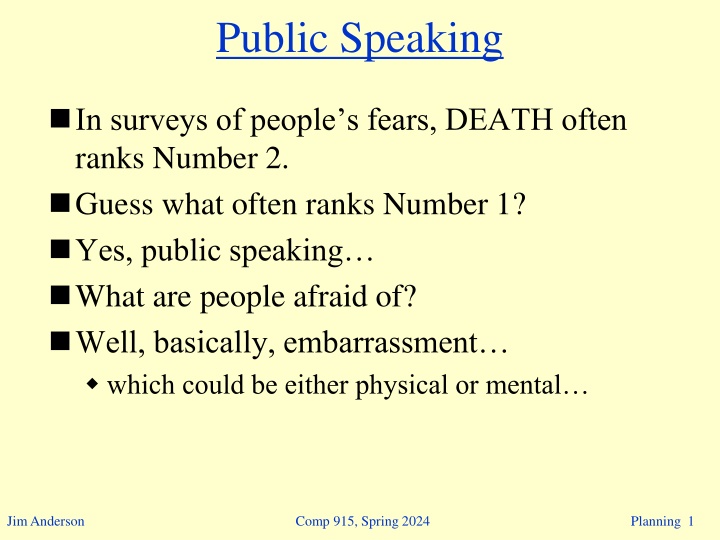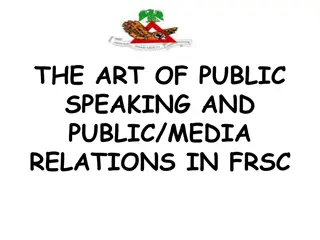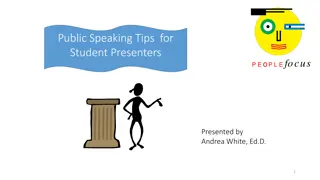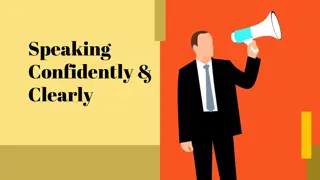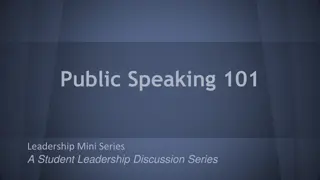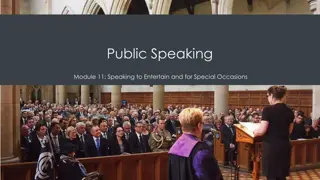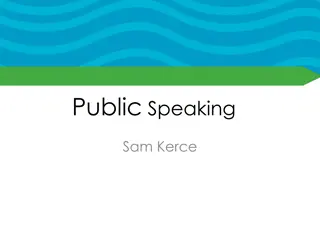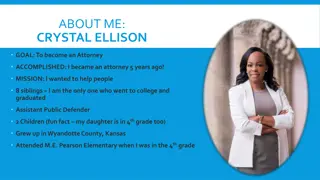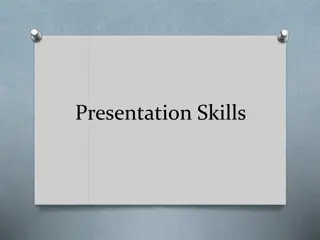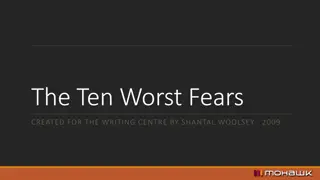Overcoming the Fear of Public Speaking: Tips for Success
Surveys show that public speaking is a top fear for many, even ranking above death. The fear usually stems from a fear of embarrassment, whether physical or mental. To reduce the odds of feeling embarrassed, proper preparation is key. This includes physical preparations like having a checklist and mental preparations like thorough rehearsal. Setting basic goals such as competence, calmness, and graciousness can help speakers appear more confident. Effective talk preparation involves understanding your audience and outlining key points with good flow. A structured talk outline typically includes setting the stage, stating a dilemma, providing solutions, detailing specifics, and wrapping up with evidence of the solution's effectiveness. Handling questions gracefully is also crucial, requiring speakers to slow down, think, and be open to saying "I don't know." Preparation and practice are vital for success in public speaking.
Download Presentation

Please find below an Image/Link to download the presentation.
The content on the website is provided AS IS for your information and personal use only. It may not be sold, licensed, or shared on other websites without obtaining consent from the author.If you encounter any issues during the download, it is possible that the publisher has removed the file from their server.
You are allowed to download the files provided on this website for personal or commercial use, subject to the condition that they are used lawfully. All files are the property of their respective owners.
The content on the website is provided AS IS for your information and personal use only. It may not be sold, licensed, or shared on other websites without obtaining consent from the author.
E N D
Presentation Transcript
Public Speaking In surveys of people s fears, DEATH often ranks Number 2. Guess what often ranks Number 1? Yes, public speaking What are people afraid of? Well, basically, embarrassment which could be either physical or mental Jim Anderson Planning 1 Comp 915, Spring 2024
Reducing the Odds of Being Embarrassed Physical: Have a checklist and be methodical about it. Use the restroom beforehand, have a water bottle with you, check your hair, whatever. Mental: Prepare prepare prepare! It s work! Some preparation tips Jim Anderson Planning 2 Comp 915, Spring 2024
Basic Goals for Any Talk You want to appear: Competent You have to do your homework, know related background, organize your material so that it is understandable, spend time practicing (particularly for important talks like job talks). Calm You want to deal with questions without panicking. Also, try to avoid nervous habits and filler words (like like ). Videotaping yourself can help a lot! Gracious Appear grateful for the opportunity to speak (but don t gush). Jim Anderson Planning 3 Comp 915, Spring 2024
Talk Preparation Begin by asking yourself: What am I trying to accomplish (or teach my audience)? Three major points is about all people can take. Who is my audience? This may impact the background you present and how you present the details. Then create an outline. A good talk has good flow. An old adage: Tell em what you re gonna tell em. Tell em. Tell em what you told em. Comp 915, Spring 2024 Jim Anderson Planning 4
Talk Flow A typical talk outline for me: 1. Set the stage, i.e., provide context. 2. State a dilemma or driving problem to motivate the work. 3. Provide a broad overview of the solution. 4. Dive into some of the details. Another old adage: A good job talk should lose anyone who s not an expert in the middle. I totally disagree with this! Dr. Brooks: Speak to inform, not to impress. If you really inform, that will impress. Craft good visuals and examples to get across complex ideas without overwhelming. 5. Return to the dilemma or driving problem and provide evidence that my solution is really a solution. Jim Anderson Planning 5 Comp 915, Spring 2024
Dealing with Questions First, realize that anyone can be tripped up. If you mess up an answer, don t worry about it we ve all been there! Some tips: Slow down, parse the question, think, then speak. It s OK to say I don t know (being gracious here can help). Offline: In preparing, try to anticipate questions. Put yourself in the audience s shoes. Think about leaving holes in your talk that will almost certainly create questions (that you know how to answer!). Offline: Practice in front of a real audience, especially for important talks (like job talks). Jim Anderson Planning 6 Comp 915, Spring 2024
Dont be Boring Try to project confidence and enthusiasm (even if you re not feeling it). Vary your speaking pitch, tempo, and rhythm. Make sure you appropriately project your voice! Talks that are too long lead to speaking that is too fast! Finishing a bit early is better than going long! Move around. Use humor now and then if your personality allows. Avoid canned jokes. Self-depreciating humor works best. Jim Anderson Planning 7 Comp 915, Spring 2024
Project Your Voice Speak to the people on the back row, not the people on the front row. If you re offered a mic, use it. If it s a clip-on, clip it on high near your face. Look at the audience, not the screen. If your head is turned to the side looking at the screen, the mic may not pick you up. Turning your head back and forth taking peaks at the screen can make your voice go in and out of the mic. Jim Anderson Planning 8 Comp 915, Spring 2024
Jims Theory of diminishing nervousness. Jim Anderson Planning 9 Comp 915, Spring 2024
Disclaimer In constructing these notes, I was mainly thinking about conference talks and job talks. Some of this advice applies to teaching, but in that context, you have limited preparation time. E.g., you re probably not going to videotape yourself and practice every time you teach a class! Jim Anderson Planning 10 Comp 915, Spring 2024
